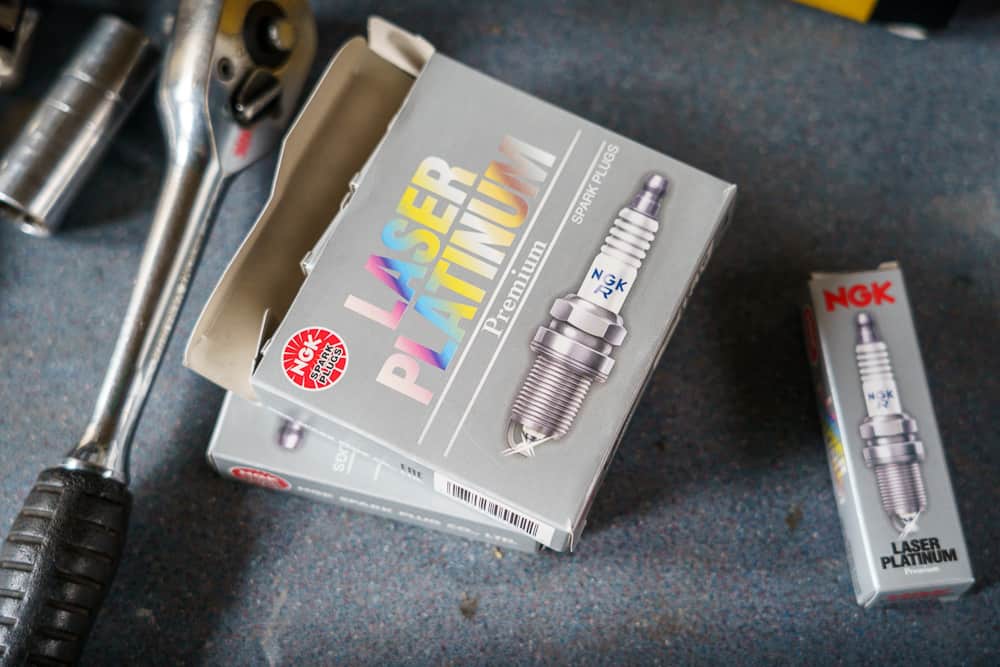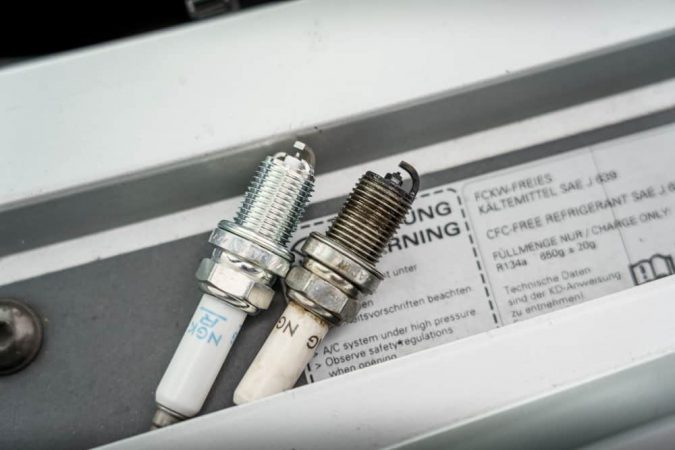When it comes to picking spark plugs, NGK vs Denso is a question that pops up in most people’s minds. Pitting NGK vs Denso is no mistake as both these companies are at the top of their game. How do you choose?
In this article, we will get your shovels ready and dig deep into this comparison. Which spark plug offers the better value? Which is more efficient? Overall, who comes on top when we pit NGK vs Denso spark plugs?
- What Are Spark Plugs?
- Hot And Cold Spark Plugs
- Copper vs Iridium vs Platinum
- NGK vs Denso Spark Plugs
- Verdict
What Are Spark Plugs?
Before we start digging, we need to understand the construction and functioning of a spark plug. This little component is so important to the functioning of the engine that it will be criminal to ignore its role.
In a spark-ignited engine, like a gasoline engine, there should be a spark source to ignite the fuel. Hence the spark plugs come in. It is not that simple though. The seemingly uncomplicated part does hold a lot of tech. The construction of the spark plug also has a bunch of complex elements that make it what it is.
Different manufacturers use different techniques and designs for their spark plugs. When you pit NGK vs Denso, this difference in construction is what we consider while making a decision.
In an internal combustion engine, the ignition of fuel happens in the combustion stroke. After the upward movement of the piston compresses the air-fuel mixture, spark plugs ignite the fuel to produce the explosion inside the cylinder. The power from this combustion powers the cylinder back down.
The spark plug uses an extremely high voltage current for producing the sparks. The ignition coil generates this current. The spark created by the spark plug can carry colossal temperatures. Sometimes as high as 60,000 K.
Parts Of A Spark Plug
The main parts of a spark plug include a central conductor, shell, insulator, and a few other parts. Let us have a look at what the spark plug consists of. This will give us a better insight into the NGK vs Denso fistfight when we discuss it later.
1. Terminal Connection
Let us start from the very top of the spark plug. The terminal of a spark plug is what connects it to the ignition system. The design and type of the terminal can differ from spark plug brand to brand. Most cars feature a solid nut with wires attached to the spark plugs using eyelet connectors under the nut.
There are other types of terminals like ones with an open thread, and these find use in ATVs and motorcycles.
2. Insulator
With extremely high voltages running through it, ample insulation is necessary for a spark plug. Else, it can damage the components in contact with it, by triggering a short circuit.
The insulator of choice in a spark plug is of a ceramic type. Sintered Alumina is commonly used for this purpose. Noted for its hard, brittle character, this material is highly effective in keeping the colossal voltages confined inside the spark plug.
The insulator usually has a ribbed shape instead of a smooth surface. Electrons rushing through the central electrode tend to travel to the bottom end of the spark plug, which is grounded to the engine. The ribbed shape of the insulator increases the distance electrons have to travel to reach this position
The insulator also lends structural support to the spark plug. In some vehicles, this insulator portion can extend out of the spark plug recess, making it more accessible to anyone working on it.
3. Central Electrode
The central electrode is the heart of the spark plug. This is the path the current takes to reach the bottom of the plug, where it creates the spark. The electrode is responsible for carrying extremely high voltages; hence it is imperative for it to have high electrical conduction properties.
The material used for making electrodes is important. Owing to the relative inexpensiveness and high electrical conductivity of copper, it became an easy and popular option.
There is a resistor embedded into the central electrode. This helps to reduce the Electro-Magnetic Interference (EMI) or Radio Frequency Interference (RFI) that the spark plugs’ functioning creates. If not contained, these can interfere with your electronic gadgets like the Powertrain Control Module (PCM), infotainment system, your mobile phone, and others that you use inside your car.
The bottom end of the electrode is the tip. This can be made with a combination of Copper, Nickel, Chromium, Iron, or noble metals. This tip is sharpened into a point. This is to create a sharp edge, as it triggers a better spark. But copper electrodes tend to wear out quickly, creating a blunt end instead of a sharp point.
To alleviate this issue, new electrode materials are introduced. Enter the Platinum and Iridium spark plugs. We will detail them in an upcoming section.
4. Ground Electrode
The ground electrode completes the circuit of a spark plug. It sits welded to the side of the metal shell, and it bends over the bottom tip of the central electrode, leaving a small gap between them. This gap is responsible for creating the spark.
The ground electrode is usually made out of nickel steel. But to improve the thermal conductivity, some ground electrodes come with a copper core. To improve the firing of the spark plug, some models even come with more than one ground electrode.
Just like the tip of the central electrode, the ground electrode can also wear out, leaving a blunt tip. This can reduce the effectiveness of the spark plug. Manufacturers often add small pads of iridium and platinum to the ground electrode to minimize this effect.
5. Screw Thread
This is merely a structural part of the spark plug, but it plays a key role. The screw thread allows the spark plug to screw into the head. This arrangement makes it easy for anyone to replace spark plugs.
6. Hex Nut
To interface with the screw threads, spark plugs have a hex nut. You can easily screw out your spark plug by using a special tool that plugs into this hex nut.
What Are Hot And Cold Spark Plugs – NGK Vs Denso
As you can easily read from their names, hot and cold spark plugs are differentiated between them based on their operating temperatures. The heat range of a spark plug comes into light when you consider a secondary function played by spark plugs.
In addition to igniting the air-fuel mixture, the spark plugs also transfer heat. They take heat away from the cylinder and transfer it onto the head, where it is cooled by the flowing coolant. The heat range of the spark plug shows us the effectiveness of a certain spark plug in this function.
The cold spark plugs transfer heat more quickly while hot spark plugs are a little slow at this. Hence colder spark plugs are preferred for high-performance engines, where heat can be an issue. The hotter plugs are preferred by low heat applications.
The hot and cold spark plug scene is not black and white. There is a range of heat exchange capacities mentioned by spark plug makers that determine which spark plug is right for an application. This range can vary from manufacturer to manufacturer.
If you are pitting NGK vs Denso, NGK uses a range that varies from 2 to 12, 2 being the hottest and 12 being the coldest. Denso on the other hand uses a range that spans from 9 to 37. The 9 is the hottest of the bunch while 37, you get the gist.
Where Can You Use Hot And Cold Plugs?
Stock cars with naturally aspirated engines may not require very cold plugs. Hence, they can make do with slightly hot plugs. Not the hottest ones though. The hottest plugs are usually ineffective in motor vehicle engines. These finds use in tiny combustion engines like the ones you may find in lawnmowers.
If your car is turbocharged and is running a lot of boost, you may have to upgrade to a colder plug. But this should only be done as per the advice of an experienced tuner. Choosing between NGK vs Denso can also be a debate of its own.
Your tuner has seen the best and the worst examples so listen to him/her. Running a hot plug while on high boost may overheat the engine. Especially if your vehicle is all kitted out in race mode with a huge amount of boost, nitrous injection, and whatnot.
Why Can I Not Always Use Cold Plugs?
Well, good question. If cold spark plugs are all great at taking heat away, why can’t you buy a cold spark plug, fit it into your engine, and drive away without worrying? Some additional heat dissipation will not hurt, won’t it? We wish it is true, but it is not that simple.
IC engines are engineered to run at a certain heat range. The manufacturer defines this envelope after rigorous research, development, and testing. Anything beyond this can damage the engine while anything below this may not burn off the carbon deposits. It is thus necessary to keep the engine running in that optimal range.
This ideal temperature range is maintained by the elaborate cooling system every vehicle has. This is also supplemented by the cooling action of the spark plugs. So, depending on the amount of temperature your vehicle’s engine makes, your spark plug’s thermal rating should change.
If you run a properly cold plug on a regular vehicle, you end up risking the temperatures falling too much. This can end up creating carbon deposits inside the engine that otherwise would have burned off.
So, it is always ideal to stick to the specification of the spark plug recommended by the manufacturer. This holds true until you modify the engine. If your tuner recommends going a step or two colder, it would be a clever idea to do so. Else, sticking to the original spec will take you places. Choosing between NGK vs Denso will not be an issue as both companies offer an elaborate range of spark plugs across the thermal range.
Copper Vs Platinum Vs Iridium Spark Plugs – NGK Vs Denso
When we talk about NGK vs Denso spark plugs, the material used in the construction of these spark plugs must be considered for comparison. Especially, the material used for making the central electrode needs special attention.
Generally, spark plugs utilize copper as a material for making the central electrode. With their high electrical conductivity and relatively affordable cost, copper spark plugs are what our elders call cheap and cheerful. But this material does have its own limitation.
The blemish in the reputation of reliable copper plugs comes in the form of longevity or the lack of it. The effectiveness of the spark created by a spark plug comes from the pointy tip of the central electrode. Copper despite its tough nature, can wear away quickly under high pressure and heat.
If high pressure and heat are not your best friend, an engine may not be the right place for you. The more is the degradation, the blunter the tip of the electrode will be. The blunter the tip is, the weaker the spark.
But it does not mean that copper plugs fry out every hundred miles. Copper electrodes are coated with Nickel-alloy, allowing it to last for about 20,000 miles, which is pretty decent.
But compared to the tougher Platinum plugs, which can last up to 100,000 miles, this may be puny.
1. Platinum Spark Plugs
Platinum is a ridiculously hard material. Much harder than the nickel-alloy, making it way more durable. The hard nature of the platinum metal allows it to hold its sharp edge for longer, hence providing a better spark.
While copper plugs tend to run slightly cold, platinum plugs run a bit hot. This can help in burning away deposits off the tip, keeping the sharp edge in shape.
Two types of platinum electrodes are available in the market. Single platinum plug and double platinum plug. The single platinum plug has a platinum disc on the central electrode while the double-platinum plug has discs on both central and side electrodes.
So, if platinum is so tough, is it the holy grail of spark plugs. Nah! Meet the iridium spark plug.
2. Iridium Spark Plug
Iridium as a material is extremely strong, eight times stronger than platinum. It is also six times tougher and has a 700-degree higher melting point. Combining all this together, an iridium spark plug can outlive its platinum counterpart by 25% longer.
In the NGK vs Denso debate, both the spark plugs have an upper hand here, as both of them are made of iridium.
Of course, this comes with a price. While copper plugs are cheap and cheerful, platinum takes the cheap out of the equation. The iridium plugs take it a step further, with the highest prices.
This article here will explain the difference between Platinum and Iridium spark plugs in detail.
NGK vs Denso: Which Is The Best Choice?
NGK vs Denso comparison cannot be done on the grounds of materials, as both of them are iridium plugs. With the iridium material comes longevity. These plugs provide longer life than platinum plugs and a lot more life than common copper plugs.
With their tough nature, Iridium plugs stay stable in their operation over long miles. They also do not grow the gap, keeping the spark constantly strong. Due to their effective operation, both NGK and Denso iridium plugs are known to take the stress away from the ignition system.
But if both these spark plugs are similar in operation and offer the same benefits, does it not render the NGK vs Denso story moot? Not really. Beyond the same material, NGK vs Denso spark plugs has different constructions. This gives them the differentiating factor that lets you choose one above the other, with respect to your application.
1. NGK Spark Plugs
Let us look at the first contender from the NGK vs Denso spark plug fistfight. As we already know, the NGK plugs are iridium plugs that offer long life and optimum performance for years. This means that it can be more expensive than other spark plugs. But pitting NGK vs Denso, the pricing is at par as Denso utilizes iridium for their spark plugs as well.
But the usage of iridium gives NGK plugs a thorough edge over other regular spark plugs. That is an opening score for the NGK. It does not help much against Denso as it too is an iridium plug.
What does go well for the NGK plug is the trivalent coating it offers on its plugs. This coating sits on the thread of the plug. It shines as a chrome or silver finish on the plug. The trivalent coating helps by offering protection against corrosion, moisture, and chemicals, improving the life of the plug. While removing the plug from its socket after usage, this coating acts as a releasing agent as well. This makes it easier to replace.
On the cost front, they do match up to one another due to the usage of iridium. But NGK plugs are slightly cheaper than the Denso offerings. On top of this, NGK offers more stable performance over an extended period of time. It is known to outlast Denso plugs by a small but significant margin.
With all this, NGK looks like the perfect choice in this debate. Before you put an end to the NGK vs Denso debate, let us listen to what the competition has to say. Denso is not going away without a fight.
2. Denso Spark Plugs
The iridium-tipped competition for the NGK spark plug mainly comes from Denso, an industrial leader in spark plug manufacturing since 1959. Just like NGK, Denso manufactures spark plugs that are more expensive than the regular copper plugs available in the market.
Similar to the NGK, the iridium construction makes it more durable. It helps the Denso plug to offer consistent spark performance over a lengthy period of time. As we have already discussed, Denso plugs are more expensive than the NGK. So, if NGK can do almost everything Denso can, and it retails at a cheaper price, why look at Denso? Well, it has its own reasons.
Denso makes its plugs using a cutting-edge 360-degree laser welding process. With this process, Denso plugs ensure minimal misfires and better acceleration. The electrode diameter is smaller than that of the NGK plug, improving ignitability. The thinner the electrode, the sharper the tip, and the better the spark.
Denso also comes with a “twin-tip” design that combines durability and better performance, both at once. Another aspect of Denso plugs is the smaller gap. Denso plugs come with a pre-set gap of 0.047, while NGK has a gap of 0.054. The larger the gap, the more the amount of energy needed to jump that gap and create the spark. On this front, Denso scores.
But there is a double-edged sword in the arsenal of Denso. The thin electrode may be particularly good at producing optimal sparks but, it is not great at lasting for long. The thinner the electrode is, the faster it degrades. The iridium and platinum help it last way longer than a regular spark plug but compared to an NGK plug, it misses out on a few thousand miles.
Denso vs NGK Spark Plugs: Facts You Need to Know
- Spark plugs are crucial for the proper functioning of a car’s engine.
- There are different spark plug models in the market, with two popular ones being Denso and NGK.
- Both Denso and NGK are iridium spark plugs, which last longer and work at a low temperature compared to copper and platinum.
- Iridium spark plugs are not the best in terms of performance, but they have a longer lifespan.
- Denso plugs have superior hardness and produce more powerful sparks but do not last as long as NGK units.
- NGK plugs are cheaper and offer stable, consistent performance, making them a standard replacement for platinum alternatives.
- Denso plugs are installed on almost every automobile model manufactured in Japan.
- NGK plugs have a longer lifespan than copper plugs and require less maintenance.
- In choosing between Denso vs NGK, choose Denso if you care about horsepower, and NGK if you want stable, long-lasting performance at a lower cost.
- Both Denso and NGK spark plugs work well with all types of vehicles, from light cars to heavy-duty pickup trucks.
What To Pick? NGK Vs Denso?
Well, both the plugs are iridium units that offer durability, longevity, and improved performance. Both being reputed names in the industry, quality is at par with one another, hence ruling that out as a dipstick. So, to produce a verdict for the NGK vs Denso debate, we had to dig deeper. And guess what, we do not have a winner. Well, somewhat.
NGK plugs are cheaper and long-lasting. They offer a long, effective life for a slightly cheaper price. This is perfect for someone looking to upgrade from a copper or a platinum plug. If you want a long-lasting plug that is comparatively easy on the pocket, NGK it is.
Denso scores in terms of performance. The latest manufacturing process, smaller gap, and thinner electrode give it the ability to produce effective sparks all through its life. Yes, it offers less life than the NGK, but if performance is your objective, Denso is the way to go.
So that settles the NGK vs Denso debate. NGK offers more life, but Denso offers better performance but with a slightly lower life. So, your answer to the NGK vs Denso question is down to your preferences.




